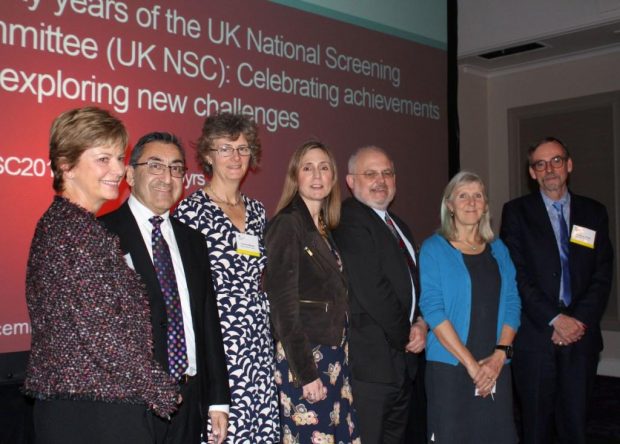It’s hard to believe it's a year since the first UK National Screening Committee (UK NSC) conference, in December 2015.
In his closing speech a year ago, Professor David Walker, the previous UK NSC chair, committed to running a second event in 2016. So it was with a lot of anticipation that we went to the Grand Connaught Rooms in London on 14 December for this year's conference.

In some ways, preparations for this year’s event were less stressful as we had a bit more idea what we were doing. On the other hand, we really wanted to build on 2015’s success, so the pressure was on.
20th anniversary
The conference was an ideal opportunity to mark the 20th anniversary of the UK NSC’s formation, look back at its achievements so far and think about the opportunities and challenges ahead.
Unfortunately, despite everyone’s best efforts, technology gremlins caused a few problems at the start of the day when the videos wouldn't play, including the keynote speech by Sir Muir Gray, the first director of the UK NSC.
Luckily, Dr Hilary Dobson, chairing the morning session, was completely unflappable and deftly swapped things round until the audio visual issues could be fixed. When they were, delegates watched an inspiring short montage of some previous UK NSC chairs talking about the Committee’s successes.
https://www.youtube.com/watch?v=YlwhY-6uc40
We then had a real treat. The indefatigable Sir Muir gave a tour de force summary of the history of the UK NSC and the national screening programmes in the UK.
In the first part of his pre-recorded speech, I was particularly struck by his ground-breaking work to introduce proper systems for population screening and the difference between the efficacy of screening in a research setting and its effectiveness in ‘real life’.
https://www.youtube.com/watch?v=kpalVL4G8UU
In the second half, Sir Muir focused on a number of challenges such as how to measure the benefits, harms and economic value of screening.
https://www.youtube.com/watch?v=cFia_3UPe0s
Delegates were given the Ernest Hemingway challenge of summarising the UK NSC’s journey so far in just 6 to 10 words. They came up with some fantastic efforts, including:
- 10,000 lives, limbs and brains saved annually
- better health and longer lives
- careful consideration – more good than harm
- prevention is better than cure
We had 3 excellent presentations on recent UK NSC recommendations – rubella susceptibility, sudden cardiac death and pulse oximetry screening for congenital heart defects.
To pick just one example, Dr Sunil Bhanot, a member of the committee, gave a powerful account of why – despite the excellent awareness-raising of groups like Cardiac Risk in the Young – a screening programme isn’t yet viable for sudden cardiac death.
Benefits and consequences
Dr Angela Raffle started the afternoon by summarising the benefits and consequences of screening. She reminded us how the UK NSC's work to introduce consistent, evidence-based programmes has transformed screening. She also rightly advised against being “smug, self-satisfied or complacent” as there’s always much more to do.
The interactive session put delegates into the UK NSC’s shoes for an hour while they discussed whether 2 imaginary conditions (marmalidosis and familial hypersolidentitity) would merit further detailed work to assess their potential as screening programmes.
Many delegates were quite conservative in wanting more information before these imaginary conditions could be considered for further review. This reinforced Angela’s point that a badly evidenced or thought out screening programme can lead to a range of unexpected or negative consequences.
One of the most successful outcomes of the day was the opportunity for the UK NSC to see things from its stakeholders’ perspective – and vice versa. Hopefully this dialogue and mutual understanding between the UK NSC and its stakeholders can continue to be built upon.
One interesting discussion point was whether some GPs could deprioritise people with symptoms (for example, of colorectal cancer) who’d had a negative screening test result. Angela explained that symptoms should never be ignored as screening doesn’t give any future protection from a condition.
Prof Bob Steele closed the day by thanking all the delegates for attending and contributing so wholeheartedly to proceedings. I think everyone left in agreement with his final point:
You might disagree with us about a particular screening recommendation but I hope that you feel reassured that the UK NSC takes its work seriously.
So a huge thanks to everyone who attended. Please remember to fill in the survey if you haven’t already. We haven’t yet decided when to hold the next conference but do let us know your thoughts – either in the survey or by contacting the helpdesk.
Remember, there are always lots of ways to get involved in the UK NSC’s work. You can respond to consultations, make submissions to the annual call for topics or contact us with any other queries you have.
And finally, a very Happy Christmas and a peaceful New Year to all our blog readers. I look forward to seeing many of you at our next event.
Introduction to the new chair and the aspirations for the UK NSC for the next decade, by Bob Steele
UK NSC recommendation presentations: Rubella susceptibility, by Hilary Angwin
UK NSC recommendation presentations: Sudden cardiac death by Sunil Bhanot
UK NSC recommendation presentations: Pulse oximetry for congenital heart defects, by Graham Shortland
The annual call for topics, by Anne Mackie
PHE Screening blogs
PHE Screening BLOGs provide up to date news from all NHS screening programmes – replacing our previously published newsletters.
You can register to receive updates direct to your inbox, so there’s no need to keep checking for new blogs.